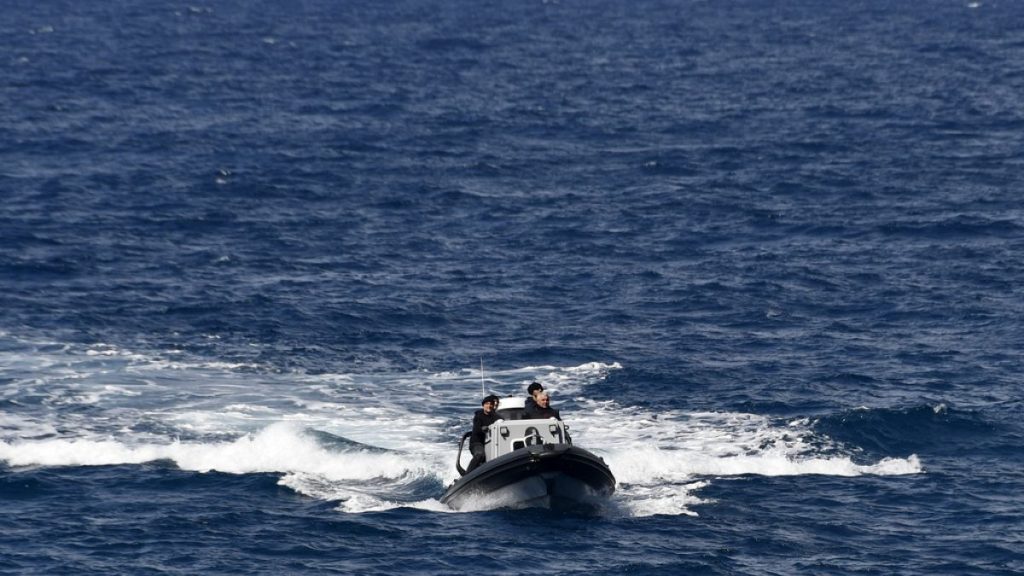The Aegean Sea bore witness to another tragic migrant boat capsizing on Friday night, approximately 12.5 nautical miles southwest of Gavdos, a small Greek island south of Crete. The incident, involving a fragile wooden dinghy overloaded with approximately 80 migrants, has resulted in a confirmed death toll of five men, with a further 40 individuals still missing, feared lost to the unforgiving waters. While 39 survivors were pulled from the sea, the ongoing search and rescue operation continues to grapple with the daunting prospect of locating more survivors amidst challenging conditions. The incident underscores the persistent and perilous nature of irregular migration routes across the Mediterranean, marked by overcrowded vessels and inadequate safety measures.
The Greek authorities swiftly initiated a large-scale rescue operation, deploying a significant array of resources to the scene. Four coastal vessels, multiple coast guard vessels, an Italian frigate, an Air Force helicopter, and a navy helicopter were all dispatched to the area southwest of Gavdos. The combined efforts of these assets focused on scouring the turbulent waters for survivors, battling against the prevailing winds measured at five on the Beaufort scale. The swift response and collaboration between various agencies highlight the commitment to saving lives at sea, despite the inherent difficulties posed by such situations.
The survivors, numbering 39, were transported to Paleochora, a coastal town in the municipality of Kandanos-Selinos, located on the southern coast of Crete. There, they received immediate medical attention and support, likely suffering from exposure, dehydration, and the psychological trauma of the ordeal. Among the rescued, one man exhibited severe symptoms of drowning and required urgent medical evacuation. He was airlifted by helicopter at dawn to Chania Hospital and admitted to the Intensive Care Unit, underscoring the critical condition of some of those rescued from the capsized vessel.
This tragic event serves as a stark reminder of the ongoing humanitarian crisis unfolding in the Mediterranean. Overcrowded and often unseaworthy vessels, carrying individuals fleeing conflict, persecution, or poverty, attempt the perilous journey across the sea, often with tragic consequences. The wooden dinghy involved in this incident exemplifies the precarious nature of these voyages, where the combination of overloaded vessels and unpredictable weather conditions creates a recipe for disaster. The loss of life and the ongoing search for the missing underscore the urgent need for comprehensive and effective solutions to address the root causes of irregular migration and to ensure safe and legal pathways for those seeking refuge or a better life.
The incident near Gavdos echoes similar tragedies that have occurred throughout the Mediterranean in recent years, highlighting the persistent challenges and human cost of irregular migration. The dangers faced by migrants attempting these crossings are compounded by factors such as inadequate safety equipment, the involvement of smugglers who prioritize profit over human life, and the difficulties in coordinating rescue efforts in vast and often treacherous waters. The ongoing search for the missing individuals highlights the emotional toll on families and communities, as they await news of their loved ones amidst the uncertainty and grief.
The international community faces a pressing need to collaborate on finding sustainable solutions to the complex issue of irregular migration. This includes enhancing search and rescue capabilities, strengthening border management in a humane and effective manner, addressing the root causes of displacement, and providing safe and legal pathways for migration. The tragedy off the coast of Gavdos serves as a poignant reminder of the human cost of inaction and the urgent need for a concerted global effort to prevent further loss of life in the Mediterranean. It underscores the shared responsibility to protect vulnerable individuals seeking safety and opportunity and to ensure that the sea does not become a graveyard for those seeking a better future.














